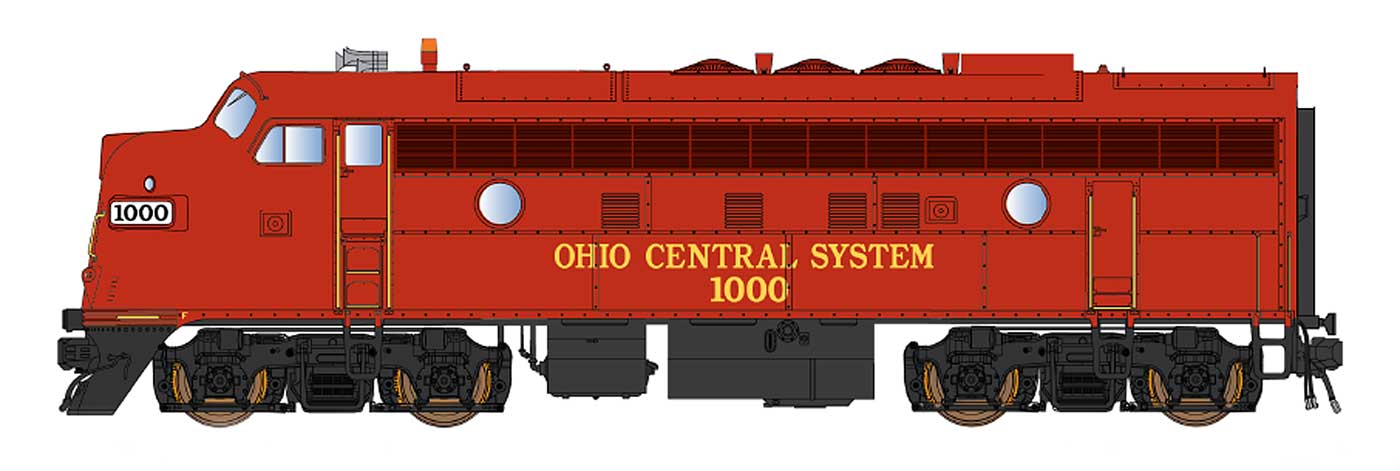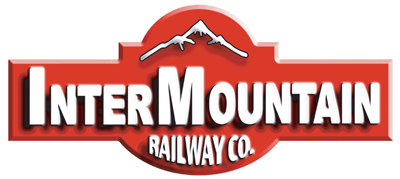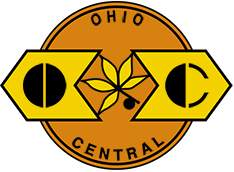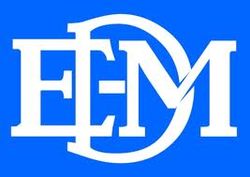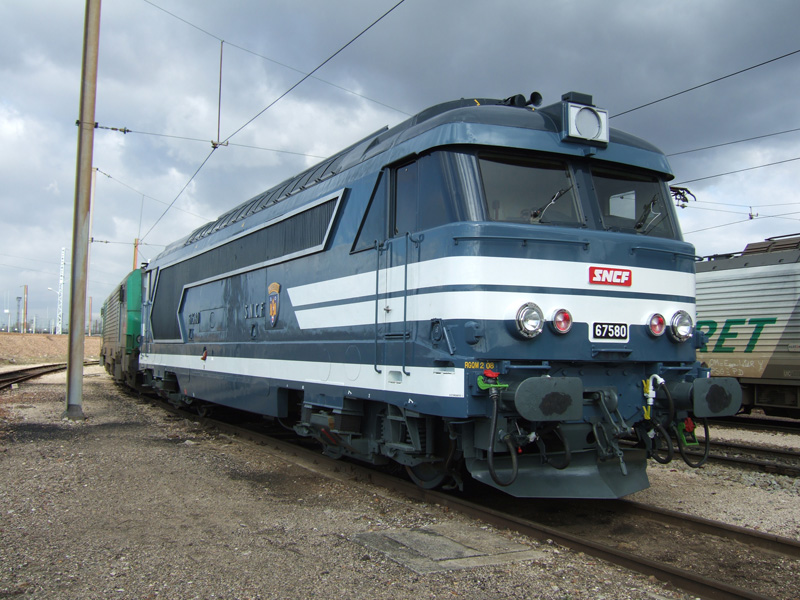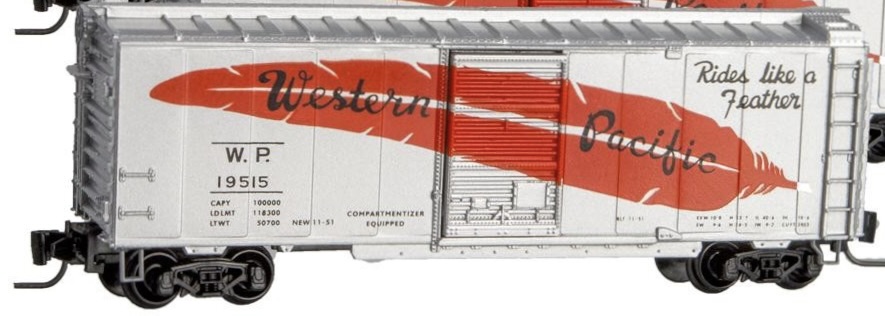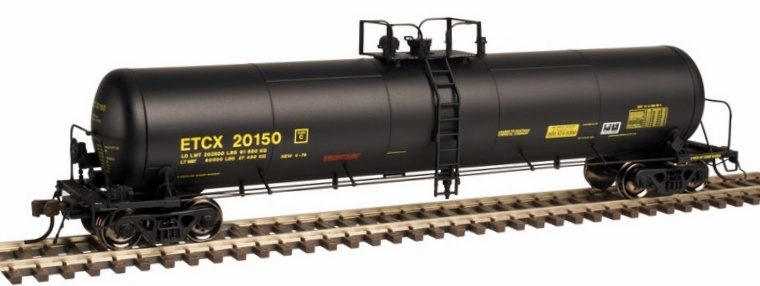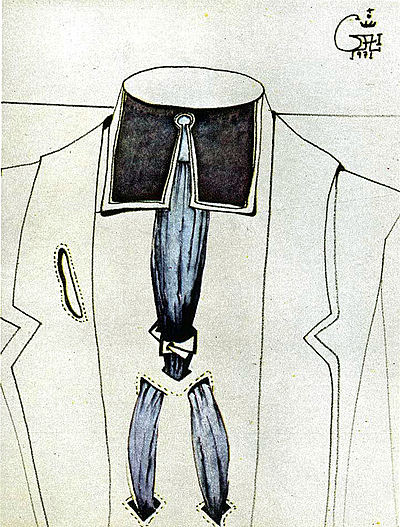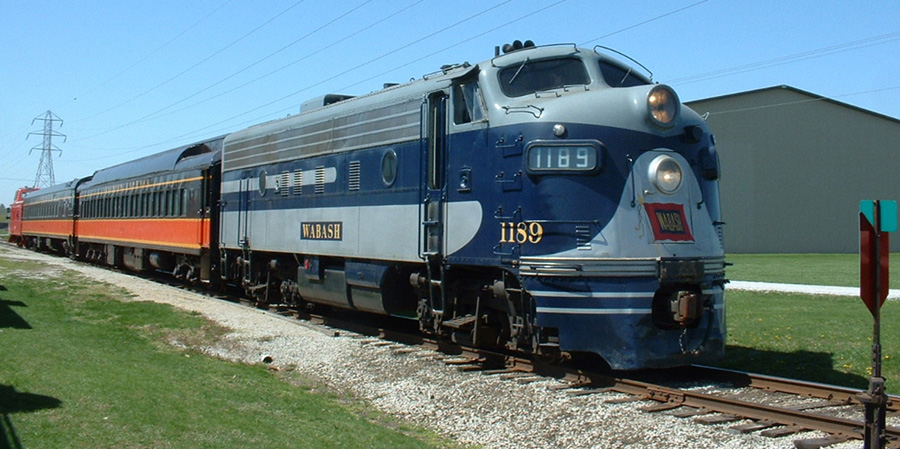Specific Item Information: Initially announced in 2013-2015 - production finally confirmed in June 2021 - released 4th Quarter 2023
Original price:
- DC: $169.95
- DCC: $219.95
- Sound: $279.95
Original price:
- DC: $169.95
- DCC: $219.95
- Sound: $279.95
Model Information:
Features of this model include (2023 run):
Features of this model include (2023 run):
- LED lighting - All lights separately controllable on DCC units.
- Upper nose MARS Light (where applicable)(single headlight units, upper nose light acts as the headlight)
- Lower Headlight (where applicable)
- Illuminated number boards
- Ditch Lights (DCC only)(No units factory equipped with ditch lights, however LEDs are provided for use by the modeler)
- Wire & Etched metal details
- Laser sharp painting and printing
- Micro-Trains compatible couplers
DCC Information:
The 2023 run is available in 3 versions:
The 2023 run is available in 3 versions:
- DC models equipped with a DC only circuit board and are DCC Ready.
- Non-Sound equipped with an ESU LokPilot 5 DCC decoder (stock number suffixed by letter D)
- Sound units equipped with an ESU LokSound 5 sound decoder. Real F7 locomotive recordings used for superior accuracy and quality! (stock number suffixed by letter S)
Prototype History: The F7 was the fourth model in GM-EMD's successful line of F unit locomotives, and by far the best-selling cab unit of all time. In fact, more F7's were built than all other F units combined. It succeeded the F3 model in GM-EMD's F unit sequence, and was replaced in turn by the F9. Final assembly was at GM-EMD's La Grange, Illinois, plant or GMD's London, Ontario, facility.
The F7 differed from the F3 primarily in internal equipment (mostly electrical) and some external features. Its continuous tractive effort rating was 20% higher (e.g. 40,000 lb (18,000 kg) for an F7 with 65 mph (105 km/h) gearing, compared to 32,500 lb (14,700 kg) for an F3 with the same gearing.
A total of 2,366 cab-equipped lead A units and 1,483 cabless-booster or B units were built. (Note: the B unit is often referred to as an "F7B", whereas the A unit is simply an "F7".)
Many F7s remained in service for decades, as railroads found them economical to operate and maintain. However, the locomotive was not very popular with yard crews who operated them in switching service because they were difficult to mount and dismount, and it was also nearly impossible for the engineer to see hand signals from a ground crew without leaning way outside the window. As most of these engines were bought and operated before two-way radio became standard on most American railroads, this was a major point of contention. In later years, with the advent of the "road switchers" such as the EMD GP7, F units were primarily used in "through freight" and "unit train" service where there was very little or no switching to be done on line of road.
From Wikipedia
Read more on American-Rails.com
The F7 differed from the F3 primarily in internal equipment (mostly electrical) and some external features. Its continuous tractive effort rating was 20% higher (e.g. 40,000 lb (18,000 kg) for an F7 with 65 mph (105 km/h) gearing, compared to 32,500 lb (14,700 kg) for an F3 with the same gearing.
A total of 2,366 cab-equipped lead A units and 1,483 cabless-booster or B units were built. (Note: the B unit is often referred to as an "F7B", whereas the A unit is simply an "F7".)
Many F7s remained in service for decades, as railroads found them economical to operate and maintain. However, the locomotive was not very popular with yard crews who operated them in switching service because they were difficult to mount and dismount, and it was also nearly impossible for the engineer to see hand signals from a ground crew without leaning way outside the window. As most of these engines were bought and operated before two-way radio became standard on most American railroads, this was a major point of contention. In later years, with the advent of the "road switchers" such as the EMD GP7, F units were primarily used in "through freight" and "unit train" service where there was very little or no switching to be done on line of road.
From Wikipedia
Read more on American-Rails.com
Road Name History: OHCR began in 1988 as a spin-off from Norfolk Southern of former Wheeling & Lake Erie (the pre-1949 W&LE) from Warwick to Zanesville, Ohio. The principle owner until recently was a medical professional who had bought a steam locomotive and wanted somewhere to run it. He would eventually build up a fleet of ten steamers of Grand Trunk Western, Lake Superior & Ishpeming, Canadian Pacific, Candadian National, Buffalo Creek & Gauley, Southern Wood Preserving Company, Nickel Plate, and Wheeling & Lake Erie ancestry. They successfully ran excursions through Ohio’s Amish communities for years, all the while building up the diesel powered freight business.
In 2008, the entire Ohio Central System was sold to the Genesess & Wyoming shortline group so the maroon, gray and yellow paint schemes are being slowly replaced by G&W’s orange black and yellow. The original owner held onto his steam fleet, the shops where they are serviced and trackage rights to run them but no longer offers regular excursions open to the public.
In 2008, the entire Ohio Central System was sold to the Genesess & Wyoming shortline group so the maroon, gray and yellow paint schemes are being slowly replaced by G&W’s orange black and yellow. The original owner held onto his steam fleet, the shops where they are serviced and trackage rights to run them but no longer offers regular excursions open to the public.
Brand/Importer Information: InterMountain was founded in 1985 by Fred Brummet. They got started in the model railroad business by producing O-Scale model kits. They got started in the N Scale business almost a decade later when in 1994 they introduced the 40-23 reefer car in kit form. Later, in 1998, they started producing RTR (Ready-to-Run) models. By the early 2000s, InterMountain phased out kit production in favor of the RTR models.
The InterMountain Railway company is located at 1224 Boston Ave in Longmont, CO. They are a manufacturer of HO, N and Z scale model trains. They have produced kits as well as RTR (Ready-To-Run) models. Their N Scale products include locomotives as well as rolling stock. Their rolling stock lineup includes Boxcars, Hoppers, Tank Cars, Reefers, Gondolas, Stock Cars and Flatcars.
Their locomotive releases have primarily been diesel units, with the one major exception being their series of AC-12 Cab Forward steam locos. Their diesel lineup includes F3's, F7's, F9's, SD40's, SD45's and FT units. They are known for quality and detail. They also release their rolling stock in larger varieties of road numbers than most of the other manufacturers.
The InterMountain Railway company is located at 1224 Boston Ave in Longmont, CO. They are a manufacturer of HO, N and Z scale model trains. They have produced kits as well as RTR (Ready-To-Run) models. Their N Scale products include locomotives as well as rolling stock. Their rolling stock lineup includes Boxcars, Hoppers, Tank Cars, Reefers, Gondolas, Stock Cars and Flatcars.
Their locomotive releases have primarily been diesel units, with the one major exception being their series of AC-12 Cab Forward steam locos. Their diesel lineup includes F3's, F7's, F9's, SD40's, SD45's and FT units. They are known for quality and detail. They also release their rolling stock in larger varieties of road numbers than most of the other manufacturers.
Item created by: CNW400 on 2021-06-28 10:50:21. Last edited by Alain LM on 2024-03-16 06:54:31
If you see errors or missing data in this entry, please feel free to log in and edit it. Anyone with a Gmail account can log in instantly.
If you see errors or missing data in this entry, please feel free to log in and edit it. Anyone with a Gmail account can log in instantly.


